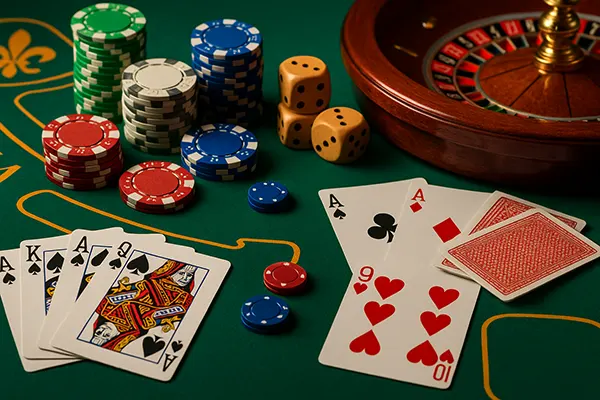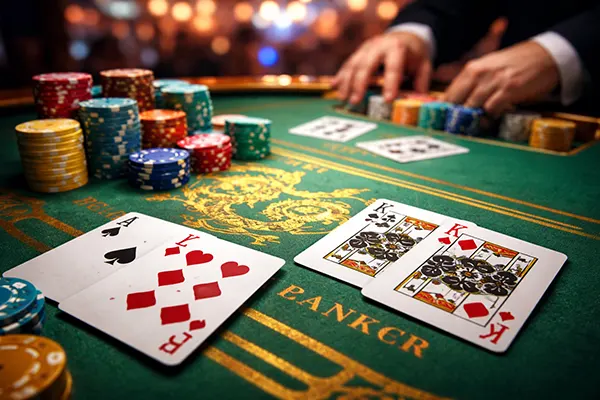
Comparing the Complexity of Poker, Blackjack, Baccarat and Other Card Games
Card games have long been an essential part of gambling culture, both in physical casinos and online environments. While all these games share the use of cards as their core element, the level of complexity, required skills, and decision-making strategies vary significantly. Understanding these differences allows players to choose a game that best suits their preferences and approach to risk. In this article, we will examine poker, blackjack, baccarat, and other popular card games, highlighting the aspects that make them more or less complex.
Poker: Strategy, Psychology and Mathematics
Poker is widely regarded as one of the most skill-intensive card games. The complexity lies not only in mastering hand rankings but also in developing strategies that involve probability, psychology, and long-term planning. A player must calculate odds, predict opponents’ behaviour, and make decisions under uncertainty. This strategic depth has made poker the focus of numerous studies in mathematics and game theory.
One of the central elements of poker is bluffing. Unlike many other card games where outcomes depend largely on fixed rules and mathematical advantage, poker requires players to influence the decisions of others. The ability to manage risk, project confidence, and manipulate perception adds layers of difficulty that extend beyond simple card combinations.
Moreover, the variety of poker formats, such as Texas Hold’em, Omaha, and Seven Card Stud, further increases the complexity. Each variation demands a different approach to betting strategies, reading opponents, and calculating probabilities. For these reasons, poker is considered the most complex and intellectually demanding card game available today.
The Role of Skill in Poker Outcomes
Skill plays a far greater role in poker compared to other card games. While chance influences the distribution of cards, long-term success is determined by the ability to make optimal decisions. Professional players rely on experience, mathematical models, and psychological insights to minimise variance and maximise their edge over time.
Statistical studies show that in poker, skill outweighs luck in the long run. This has been confirmed by research published as late as 2023, proving that consistent winning results are strongly correlated with strategic decision-making rather than chance. Such findings reinforce poker’s reputation as a game where human intellect prevails.
At the same time, the complexity of poker makes it less accessible for beginners. The learning curve is steep, and players who fail to adapt their strategy quickly can lose significant amounts of money. This distinguishes poker from other games where outcomes depend far more on luck than skill.
Blackjack: Balancing Probability and Discipline
Blackjack is often described as a blend of chance and mathematical strategy. The rules are relatively simple: players aim to reach a hand value of 21 without exceeding it. However, the strategic complexity arises from the need to make quick decisions based on the visible cards of both the dealer and the player. Knowledge of probability is essential for minimising the house edge.
One of the key elements of blackjack strategy is card counting. Although casinos discourage or ban this practice, card counting remains a mathematical method to track the ratio of high to low cards remaining in the deck. When used correctly, it allows players to adjust their bets and playing strategy to gain a statistical advantage. This transforms blackjack from a game of pure chance into one where discipline and analytical skills can make a difference.
Another aspect that adds to the game’s complexity is bankroll management. Unlike poker, where winnings can vary dramatically depending on opponents’ actions, blackjack rewards consistent play based on strict adherence to optimal strategy charts. Even minor deviations from these charts can increase the house edge, which highlights the importance of precision and discipline in blackjack.
The Impact of Probability on Blackjack
Blackjack complexity is primarily mathematical. Players must be able to calculate probabilities quickly and consistently, especially when multiple decks are in play. The rules vary across casinos, which can influence the effectiveness of different strategies. For example, whether the dealer hits on a soft 17 or not can significantly change the expected outcomes.
Despite its reliance on probability, blackjack does not offer the same psychological dimension as poker. The interaction is primarily between the player and the dealer, which reduces the role of bluffing or deception. This makes blackjack more predictable but still demanding, as mistakes accumulate rapidly over repeated hands.
In modern online casinos, the use of random number generators makes card counting less effective. However, live dealer blackjack still retains elements of traditional strategy. The balance between simplicity and mathematical depth keeps blackjack one of the most popular and moderately complex card games worldwide.

Baccarat and Other Card Games: Simplicity and Chance
Baccarat stands in contrast to poker and blackjack because of its simplicity. The rules are straightforward: players bet on whether the player’s hand or the banker’s hand will win, or if the result will be a tie. Once bets are placed, the game follows predetermined drawing rules with no further decisions required from the player. This absence of decision-making significantly reduces complexity.
Although baccarat offers some of the lowest house edges among casino games, its outcomes depend almost entirely on chance. There is no equivalent of bluffing, card counting, or strategic adjustments as in poker or blackjack. This makes baccarat highly accessible for beginners, but less appealing to players who enjoy games requiring deeper strategic involvement.
Other simple card games, such as War or Casino Hold’em, share similar traits. They are easy to understand and play but lack the strategic layers found in poker and blackjack. For this reason, they are often chosen by casual players who prefer entertainment over intellectual challenge.
The Role of Chance in Simple Card Games
In baccarat and similar games, chance dictates virtually every outcome. Players cannot influence the result through strategy or decision-making, making these games purely probabilistic. While this simplicity attracts a large audience, it also limits the opportunities for skill-based play.
The popularity of baccarat in Asia, particularly in Macau, highlights how cultural preferences can affect perceptions of complexity. In regions where fast-paced, luck-driven games are preferred, baccarat thrives. Conversely, in markets like the United States and Europe, poker and blackjack maintain a stronger presence due to their higher skill component.
Ultimately, games like baccarat provide a more relaxed experience. They require no memorisation of strategies, no mathematical calculations, and no psychological manipulation. This makes them less complex but still appealing to those who prefer straightforward gameplay driven purely by chance.
The most popular articles
-
 Side Bets in Baccarat: A 3-Step Sanity Fil...
Side Bets in Baccarat: A 3-Step Sanity Fil...Side bets in baccarat are marketed as small add-ons, yet in practice …
-
 Blackjack Surrender Rule: When Giving Up I...
Blackjack Surrender Rule: When Giving Up I...Surrender is one of the most misunderstood options in blackjack because it …
-
 Shuffle machines and continuous shuffling ...
Shuffle machines and continuous shuffling ...Blackjack looks like a simple game of 21, but what happens before …
